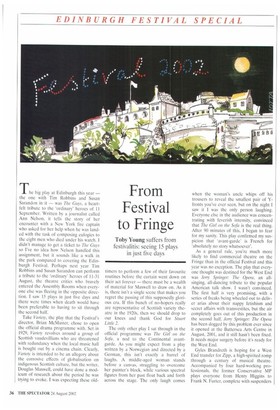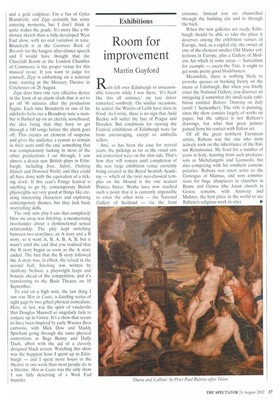From Festival to Fringe
Toby Young suffers from festivalitis: seeing 15 plays in just five days
The big play at Edinburgh this year — the one with Tim Robbins and Susan Sarandon in it — was The Guys, a heartfelt tribute to the 'ordinary' heroes of 11 September. Written by a journalist called Ann Nelson, it tells the story of her encounter with a New York fire captain who asked for her help when he was landed with the task of composing eulogies to the eight men who died under his watch. I didn't manage to get a ticket to The Guys so I've no idea how Nelson handled this assignment, but it sounds like a walk in the park compared to covering the Edinburgh Festival. Perhaps next year Tim Robbins and Susan Sarandon can perform a tribute to the 'ordinary' heroes of 11-31 August, the theatre critics who bravely entered the Assembly Rooms when everyone else was fleeing in the opposite direction. I saw 15 plays in just five days and there were times when death would have been preferable to having to sit through the second half.
Take Variety, the play that the Festival's director, Brian McMaster. chose to open the official drama programme with. Set in 1929, Variety revolves around a group of Scottish vaudevillians who are threatened with redundancy when the local music hall is bought out by a cinema chain. Clearly. Variety is intended to be an allegory about the corrosive effects of globalisation on indigenous Scottish culture, but the writer, Douglas Maxwell, could have done a modicum of research about the period he was trying to evoke. I was expecting these old timers to perform a few of their favourite routines before the curtain went down on their act forever — there must be a wealth of material for Maxwell to draw on. As it is, there isn't a single scene that makes you regret the passing of this supposedly glorious era. If this bunch of no-hopers really are representative of Scottish variety theatre in the 1920s, then we should drop to our knees and thank God for Stuart Little 2.
The only other play I sat through in the official programme was The Girl on the Sofa, a nod to the Continental avantgarde. As you might expect from a play written by a Norwegian and directed by a German, this isn't exactly a barrel of laughs. A middle-aged woman stands before a canvas, struggling to overcome her painter's block, while various spectral figures from her past float back and forth across the stage. The only laugh comes when the woman's uncle whips off his trousers to reveal the smallest pair of Yfronts you've ever seen, but on the night I saw it I was the only person laughing. Everyone else in the audience was concentrating with feverish intensity, convinced that The Girl on the Sofa is the real thing. After 90 minutes of this, I began to fear for my sanity. This play confirmed my suspicion that 'avant-garde' is French for `absolutely no story whatsoever'.
As a general rule, you're much more likely to find commercial theatre on the Fringe than in the official Festival and this year was no exception. The play that everyone thought was destined for the West End was Jerry Springer: The Opera, an allsinging, all-dancing tribute to the popular American talk show. I wasn't convinced. The first half is very promising, with a series of freaks being wheeled out to deliver arias about their nappy fetishism and secret affairs with transvestites, but the air completely goes out of this production in the second half. Jerry Springer: The Opera has been dogged by this problem ever since it opened at the Battersea Arts Centre in August, 2001, and it still hasn't been fixed. It needs major surgery before it's ready for the West End.
Gyles Brandreth is hoping for a West End transfer for Zipp, a high-spirited romp through a century of musical theatre. Accompanied by four hard-working professionals, the former Conservative MP plays everyone from Henry Higgins to Frank N. Furter, complete with suspenders and a gold codpiece. I'm a fan of Gyles Brandreth, and Zipp certainly has some amusing moments, but I don't think it quite makes the grade. It's more like a 90minute sketch than a fully-developed West End show. with no real variation in tone. Brandreth is in the Guinness Book of Records for the longest after-dinner speech and I would have thought that the Churchill Room at the London Chamber of Commerce is the proper venue for this musical revue. If you want to judge for yourself, Zipp is embarking on a national tour, starting at the Mercury Theatre in Colchester on 28 August.
Zipp does have one very effective device in the form of an alarm clock that is set to go off 90 minutes after the production begins. Each time Brandreth or one of his sidekicks belts out a Broadway tune a number is flashed up on an electric scoreboard, the idea being that they have to get through a 100 songs before the alarm goes off. This creates an element of suspense and gives the audience a reason to remain in their seats until the end, something that was conspicuously lacking in most of the other productions I sat through. I saw almost a dozen new British plays in Edinburgh, including Iron. Safety, Outlying Islands and Drowned World, and they could all have done with the equivalent of a ticking clock. If this year's Fringe festival is anything to go by, contemporary British playwrights are very good at things like creating interesting characters and exploring contemporary themes, but they lack basic storytelling skills.
The only new play I saw that completely blew me away was Stitching, a mesmerising two-hander about a dysfunctional sexual relationship. The play kept switching between two storylines, an A story and a B story, so it went A, B. A, B, A, B, but it wasn't until the end that you realised that the B story began as soon as the A story ended. The fact that the B story followed the A story was, in effect, the reveal in the second half. Stitching was written by Anthony Neilson, a playwright leaps and bounds ahead of the competition, and it's transferring to the Bush Theatre on 10 September.
To end on a high note, the last thing I saw was Men in Coats, a dazzling series of sight gags by two gifted physical comedians. Here, at last, was the spirit of vaudeville that Douglas Maxwell so singularly fails to conjure up in Variety. It's a show that seems to have been inspired by early Warner Bros cartoons, with Mick Dow and Macidy Sparham going through the same physical contortions as Bugs Bunny and Daffy Duck, albeit with the aid of a cleverly designed black screen. Watching this show was the happiest hour I spent up in Edinburgh — and I spent more hours in the theatre in one week than most people do in a lifetime. Men in Coats was the only show I saw fully deserving of a West End transfer.































































 Previous page
Previous page